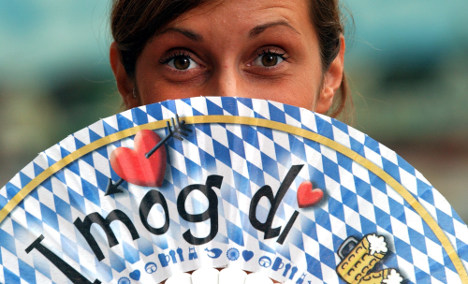1. Bairisch or Boarisch – the Bavarian language
 A Munich newspaper printed in Bairisch. Photo: DPA.
A Munich newspaper printed in Bairisch. Photo: DPA.
It’s probably important to know if you’re going to speak Bavarian that it’s actually locally called Bairisch or Boarisch.
It’s also important to note up front that since the Bavarian tongue reaches into Austria, and there are also dialects in Italy, Switzerland and Hungary, there are of course a variety of terms and spellings for things.
We’ll try to stick to what’s found in Germany.
2. Grüß Gott – greetings or good day
 Photo: DPA.
Photo: DPA.
Bavarians have their own way of greeting people, none of that “Hallo” or “Guten Tag” stuff.
The salutation Grüß Gott literally means “greet God”, and therefore maybe sounds somewhat Medieval. All part of the Bavarian charm.
And if you want to be a little more informal you can say 'servus' – which also serves as a farewell.
3. Buam und Madln – men and women
You might see this on restroom doors, and if there are no pictures to help out it could get confusing. Buam is for lads and Madln or Dirdln is for women.
4. Fesch – pretty or attractive
This is the Bavarian equivalent of the high German hübsch. So you might hear something like: “Ja mei, was für ein fesches Madl!”
Translation: “O my, isn’t she a pretty woman!”
5. Der Schmarrn – nonsense, rubbish
Someone might accuse you of talking Schmarrn if you tell a tall tale.
And if you speak too much nonsense, they may even dub you a Schmarrnbeppi.
READ ALSO: German word of the day: Der Schmarrn
6. Gell – isn’t it?
You might find this word often added at the end of a question, kind of like Germans elsewhere would use the interjections of “oder” or “ne”. It's kind of funny, gell?
7. I mog di – I like you
 Photo: DPA
Photo: DPA
Strike up a conversation with a fesch young man or woman and you might find yourself looking for the right words to describe all those fluttery feels.
I mog di – simple. I like you.
8. Pfiat di – bye-bye!
While their neighbours further north might say Tschüß upon goodbye, Bavarians prefer Pfiat di, which is short for 'behüt dich Gott, which means 'may God protect you.'
9. A Maß – a litre of beer

Waiters and waitresses at Oktoberfest are trained to carry up to 34 kilos of beer at a time. Photo: DPA
Because there is no other size appropriate for beer-drinking here.
10. Ogschdocha – drunk
You might be shouting out “I bin ogschdocha” after having one Maß too many at the beer garden, but try to keep it together to properly pronounce your newly learned Bavarian!
11. Freilich – of course
If you live in north Germany you'll already know that the word natürlich can be anything from a stern rebuke to a gesture of hearty consent. Well that word in in Bavaria is freilich. For example: Can I have another Maß? Na freilich!
12. Semme or Semml – bread roll
 Photo: DPA
Photo: DPA
Berliners prefer Schrippe and generally across the country people will understand Brötchen, but in Bavaria the word for a bread roll is Semme or Semml.
13. Fleischpflanzerl – meatball

The fine Fleischpflanzerl being served at a golf tournament in Tutzing, Upper Bavaria. Photo: DPA
The love for meatballs is found across Germany, though you may be more familiar with the term Frikadelle.
14. Der Brezl – pretzel
 Photo: DPA
Photo: DPA
You should definitely know the word for this very typical Bavarian food staple, perhaps if you want to chow down on some Weißwuascht (Weisswürst or white sausage) with it.
15. Prost – cheers
 Photo: DPA
Photo: DPA
Okay this one we hope you already know if you've spent any time anywhere else in Germany, but it's one that's definitely important to remember in this beer-proud region, birthplace of the German Beer Purity Law or Reinheitsgebot.
So cheers to your newfound expertise in Bairisch! Prost!




 Please whitelist us to continue reading.
Please whitelist us to continue reading.
Member comments